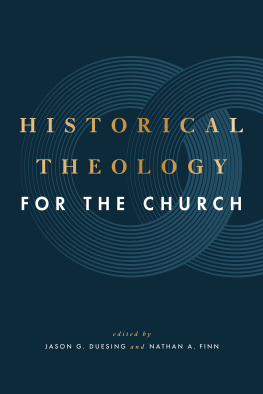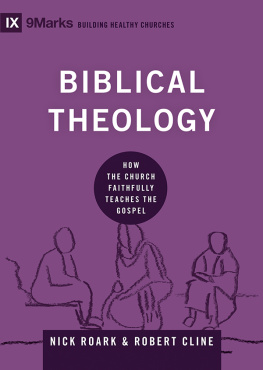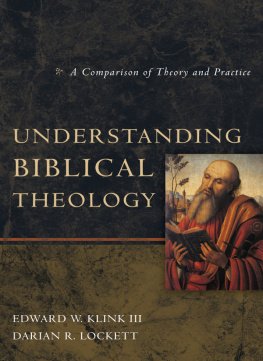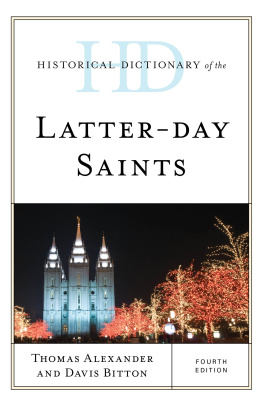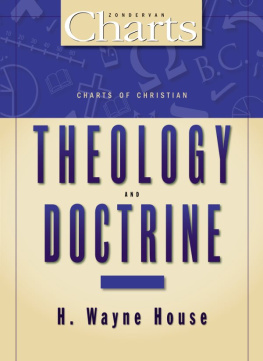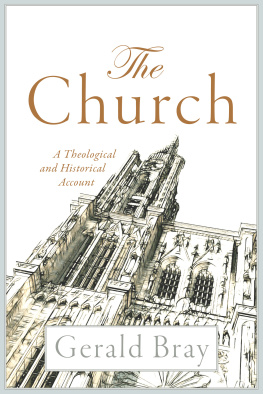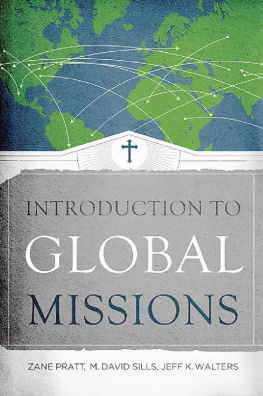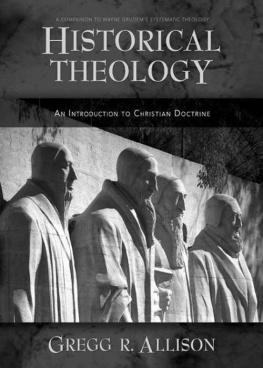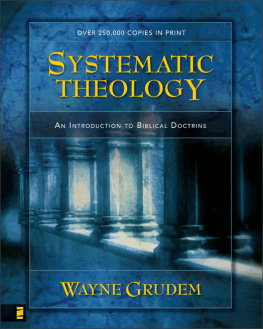Historical Theology for the Church
Copyright 2021 by Jason G. Duesing and Nathan Finn
Published by B&H Academic
Nashville, Tennessee
All rights reserved.
ISBN: 978-143364916-5
Dewey Decimal Classification: 230
Subject Heading: DOCTRINAL THEOLOGY / THEOLOGY--HISTORIOGRAPHY / THEOLOGY--HISTORY OF DOCTRINES
Unless otherwise indicated, Scripture quotations are taken from the Christian Standard Bible. Copyright 2017 by Holman Bible Publishers. Used by permission. Christian Standard Bible and CSB are federally registered trademarks of Holman Bible Publishers, all rights reserved.
Scripture quotations marked KJV are taken from the King James Version.
Scripture quotations marked NRSV are taken from the New Revised Standard Version Bible, copyright 1989 the Division of Christian Education of the National Council of the Churches of Christ in the United States of America. Used by permission. All rights reserved.
The web addresses referenced in this book were live and correct at the time of the books publication but may be subject to change.
Cover design by Mark Karis. Cover illustration by rashpil/iStock.
The church loses a healthy connection to her past at great peril for her future. This book is a superb remedy to this danger. Historical Theology for the Church is both informative and well written. It proves theology can be instructive and interesting at the same time. I like this work. I will be quick to commend this book for scholar and layperson alike.
Daniel L. Akin , president, Southeastern Baptist Theological Seminary
Drs. Jason Duesing and Nathan Finn have done the church a remarkable service by assembling Historical Theology for the Church . They, together with fourteen other top-tier contributors, give the reader an informative overview of the development of essential Christian doctrines throughout the history of church. All who love theology, church history, and the church itself will want this book and benefit from it. Im thankful for this volume and hopeful that it gets a broad readership.
Jason K. Allen , president, Midwestern Baptist Theological Seminary
Jaroslav Pelikan once said that tradition is the living faith of the dead. That being so, we need to know the theology of the dead if the church is to preserve the living faith handed down through the centuries. In Historical Theology for the Church , Duesing and Finn have provided a helpful doorway into our great tradition. This volume is full of wisdom in how to apply the riches of church history to our modern context. I hope this book will awaken many in the church to the life-giving study of historical theology.
Brian J. Arnold , president, Phoenix Seminary
In modern Christianitys rush to reject traditions as unhelpful ties to the past, the church risks surrendering the past altogether. Rather than recognizing that the faith once for all handed down to the saints comes to us by way of 2000 years of church history, todays believers find themselves trying to reinvent the theological wheel over and over again without the benefit of the experience and tools of those whove gone before. Thus, after two millennia many Christians continue to fight age-old battles or deprive themselves of the soul-satisfying fruit of their predecessors labors. This book makes great strides to correct these woeful errors. Duesing, Finn, and all the rest give the reader a thorough yet winsome look at the development of key ideas through the sands of time, handing them down to todays believer in a manner that is readable and relevant. Historical Theology for the Church breathes life once again into the past and revives it for a new generation.
Peter Beck , professor of Christian studies and Ott Chair of Theology, Charleston Southern University
Historical Theology for the Church is rooted in Scripture yet aware of tradition; encompasses the church universal while providing application for the church local; is evangelical in its orientation and evangelistic in its presentation; and is academically sound with an edifying tone. Each chapter contains substantive historical overviews, significant case studies, and salient church practices, thus providing the reader with a unique resource detailing what the church has believed, why the church has believed, and what the church should believe.
Anthony Chute , professor of church history and associate dean of the school of Christian ministries, California Baptist University
Historical Theology for the Church will serve as a wonderful gift to pastors, church leaders, students, and theologians alike. Jason Duesing and Nathan Finn have assembled a talented cohort of Baptist thinkers to serve as thoughtful and engaging guides to help us better understand the development of key theological concepts as they have been articulated and debated through the centuries. Bringing their Baptist commitments to bear on this praiseworthy work, the contributors enable us to gain a greater appreciation for a knowledge of the past, the value of tradition, and the importance of catholicity. In all of these things, the authors desire to spur us toward retrieval for the sake of renewal in our personal discipleship as well as in our worship, preaching, teaching, and service in and for the church. It is a delight to recommend this fine resource.
David S. Dockery , distinguished professor of theology, Southwestern Baptist Theological Seminary, and president, International Alliance for Christian Education
We have been waiting for a book like this for a long timewell-crafted essays, written by first-rate scholars, tracking the course of Christian belief across the centuries. Rooted in faith and aimed to build up the church, this volume is a prime example of what I have called retrieval for the sake of renewal. Warmly welcomed!
Timothy George , distinguished professor of divinity, Beeson Divinity School of Samford University
The historical development of Christian theology is one of the most important dimensions of our theological task today, and it is especially urgent in this time of doctrinal and theological amnesia. This volume combines much-needed scholarship and deep concern for the church, and it represents a hope for theological recovery in this age. Thus, it is a genuine achievement that will serve the church for years to come.
R. Albert Mohler Jr. , president, The Southern Baptist Theological Seminary
To our students
and
To local churches
that are living and creating
the historical theology of the future
Introduction
Jason G. Duesing
Therefore, he said to them, every teacher of the law who has become a disciple in the kingdom of heaven is like the owner of a house who brings out of his storeroom treasures new and old.
Matthew 13:52
The Lords Remembrancer
When David Levin set out to describe the early years of Cotton Mathers life (16631703), he dubbed him the Lords Remembrancer.
Such is a fitting description of the task of the historical theologiana servant of the church who reminds present and future readers of previous actions and theological developments from earlier eras in Christianitys history. As the Lords remembrancers, faithful historical theologians are able to serve the church present and future, but what does that entail? How is this work done? This chapter presents a retrospective survey of historical theologies and casts the vision for crafting a historical theology for the church.
What Is Historical Theology?
Before examining the past or considering the future, one must first ask whether it is even possible to arrive at an evaluation of theology in history? C. S. Lewis, in answering this question, remarked that most history cannot be known. He asserted that a single second of lived time contains more than can be recorded. Lewis was not saying everything from history is unknown, for he recognized that important parts of the past survive. What is recorded is worth knowing and analyzing, from which we can discern truths about the past to the degree that comparisons to other eras can be made. One can also track the manner in which authors understood various doctrines in their own time and context.
Next page
